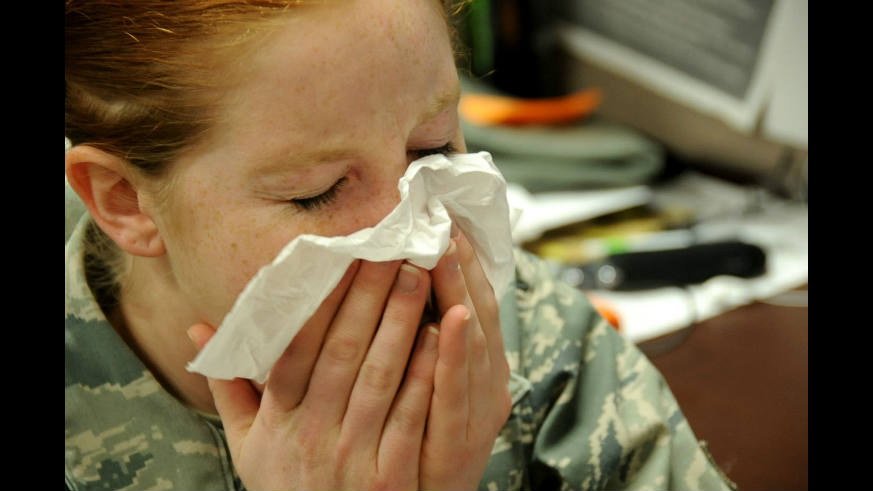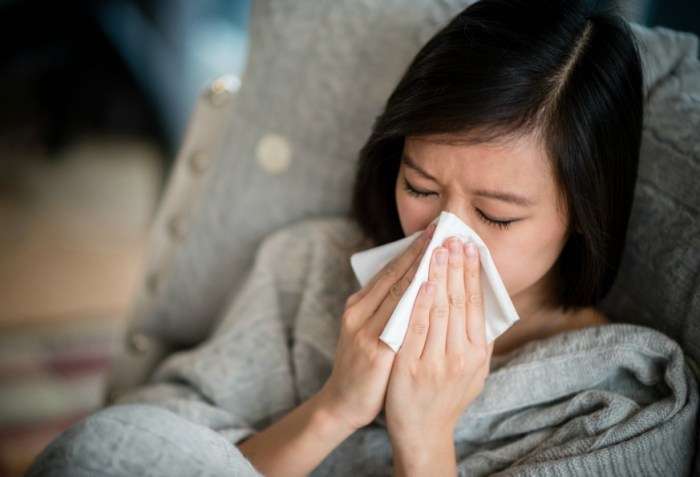You see the date on the calendar. You feel the temperature drop and watch the sun set ridiculously early. You hear fellow commuters sniffling on the train. Your immune system quivers at the very notion of cold and flu season, but getting sick doesn’t have to be inevitable. Boost your immunity system with these little extras that could make a huge difference.
Treat your immune system with a protein drip.
A recent study found that a small protein called retrocyclin-101 targets the influenza virus and inflammation.
RC-101 is a synthetic protein, but protein, in general, has been found to be helpful when trying to keep illness at bay. Eat some lean chicken or spread peanut butter on whole grain bread instead of carby comfort food.
“Protein’s the building block of immune cells and the hormones needed to prompt the immune response,” dietician Sarah Schenker said, The Mirror reported.
“People who don’t eat enough protein, such as vegans, or those on strict exclusion diets, often suffer more colds, which last longer.”
As soon as you start feeling under the weather, eat 15mg of protein every three hours, Schenker suggested.
“You need a constant drip of protein rather than a huge overload at night, which can inhibit sleep and impair your immune system,” she added.
Eat for a virus.
Colds are typically bacterial, but the flu is a virus, which is why your doctor isn’t passing you a prescription for antibiotics. A study from the Academic Medical Center in the Netherlands found that eating a big meal early in the day jacks up levels of gamma interferon in your bloodstream by 450 percent. Gamma interferon is a natural antiviral.
If you typically skip breakfast, consider this: going hungry caused a 17 percent decrease of gamma interferon, study authors said.
So, top your oats with some berries (antioxidants) and honey. The Mirror suggests opting for antiviral Manuka honey.
“As soon as summer ends, we eat less salad and fruit, and start on comforting puddings and stodgy food,” Schenker said. “But we need the vitamins and antioxidants that fresh produce supplies. That also helps maintain the levels of good, so-called ‘friendly’ bacteria, which is a vital part of your immune system.”
Seriously, stop being so gross.
A study from the Cardiff University’s Common Cold Centre found that women tend to save their used tissues for additional uses.
Unless you’re campaigning for the office of mayor of Boogerville, tissues are a one-and-done, guys.
“Common cold and flu viruses can live for 48 hours, or longer if kept in a warm place like a handbag,” Ron Eccles, a professor and the director of the center, said. “People think that as long as they wrap up the wet part, the other part of a tissue is still OK to use, but within minutes the virus will spread to the rest of the paper and even other items in the handbag.”
“Two-thirds of people who carry cold viruses show no symptoms, so you and your children could cross-contaminate each other while thinking you’re all fit and healthy, and you could even re-introduce the virus to yourself when your immune system is lower.”
Give your immune system a kick with a capsule.
When I was a junior in high school, I made out with a guy who had the sniffles at the semi-formal dance. The next school day, he brought me a gift from his mother: Echinacea.
Turns out, Mrs. B’s immunity game was on point.
Study authors from the University of Connecticut say the plant can reduce your risk of a cold by 58 percent and cut your convalescing period by a day or two.
Piggyback some vitamin C and Echinacea can reduce your chance of catching a cold by 86 percent.
Ron Culter, a virologist at Queen Mary, University of London, advised only taking the herb when you start to feel sick.
“The benefits are only effective for up to two weeks,” Culter told The Mirror. “Take it for any longer and it could prevent your immune system from working properly.”
Mind your nose.
“Our noses are the first line of the immune system,” Culter explained. “Chilling the nose slows down the action of the cilia, the hairs in the nostrils that brush away bacteria and viruses, so giving them more chance to invade the body.”
So wrap that scarf around your face and keep your schnoz toasty.



















